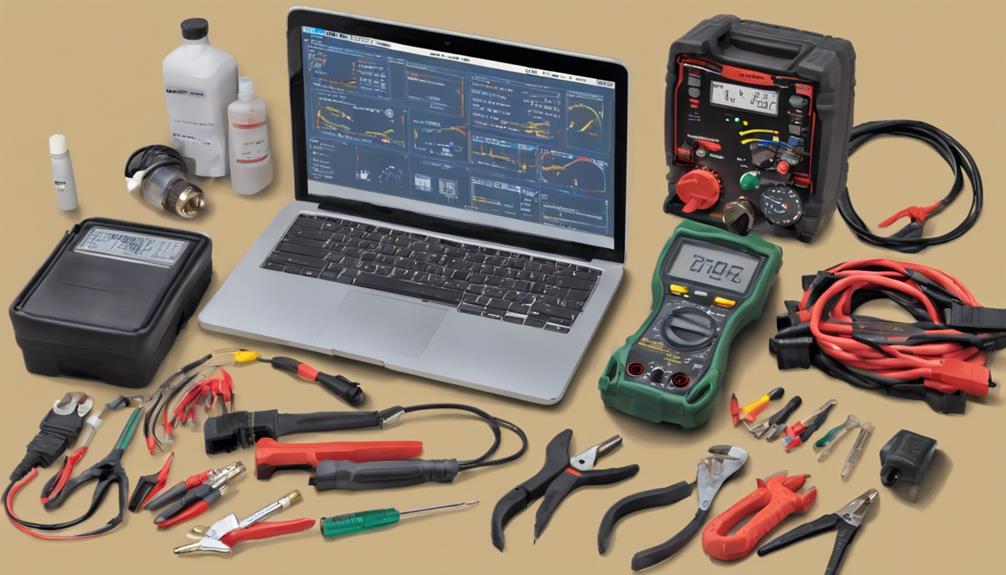Efficient engine diagnostics are critical for excellent vehicle performance, lifespan, and safety. Prioritize timely troubleshooting and early detection of warning signs like decreased fuel efficiency, unusual noises, and engine warning lights. Utilize diagnostic tools such as OBD-II scanners, multimeters, and compression testers for accurate analysis. Follow manufacturer maintenance guidelines, conduct regular fluid checks, and inspections to prevent breakdowns and costly repairs. Adherence to safety regulations, environmental compliance, and protective gear guarantee a secure workspace. Embrace preventive measures, and stay updated on maintenance protocols for outstanding engine health. Optimize performance with these essential maintenance tips.
Key Takeaways
- Regular maintenance schedules are crucial for peak engine performance and longevity.
- Promptly address warning signs like decreased fuel efficiency or unusual noises to prevent costly repairs.
- Utilize diagnostic tools like OBD-II scanners and multimeters for efficient troubleshooting.
- Adherence to manufacturer guidelines for maintenance enhances fuel efficiency and overall performance.
- Conduct regular oil changes, fluid checks, and component inspections to detect issues early and prevent breakdowns.
Importance of Engine Diagnostics
Effective engine diagnostics are essential for maintaining peak performance, longevity, and safety of the vehicle. Implementing cost-saving measures and performance optimization strategies, such as early detection through diagnostics, can prevent breakdowns and save money in the long run. Adhering to maintenance schedules not only guarantees optimal performance but also enhances safety, efficiency, and overall functionality of the engine. Timely diagnostics not only lead to improved fuel efficiency but also contribute to safety on the road. By prioritizing engine diagnostics, drivers can address issues promptly, leading to effective repairs and ultimately extending the engine's lifespan. Hence, investing in regular engine diagnostics is crucial for preserving the health of the vehicle and maximizing its performance.
Common Warning Signs to Watch
Detecting common warning signs in a vehicle's engine is essential for identifying potential issues early and ensuring peak performance and safety. Performance indicators such as decreased fuel efficiency, power loss, unusual noises like knocking or clicking, engine warning lights, smoke, odors, overheating, or stalling are vital signs that require immediate attention. Engaging in diagnostic techniques and troubleshooting at the first sight of these symptoms can prevent more severe issues and costly repairs down the line. Regular maintenance plays a key role in addressing these warning signs promptly, maintaining peak engine health, and preventing unexpected breakdowns. By staying vigilant and proactive in monitoring these indicators, drivers can enhance their vehicle's longevity, efficiency, and overall performance while ensuring safety on the road.
Essential Tools for Diagnostics

Utilizing the appropriate tools is paramount for accurate and thorough engine diagnostics. When it comes to diagnosing engine issues, having the right equipment can make all the difference. Here are some essential tools for diagnostics:
- Diagnostic equipment: OBD-II scanners are essential for trouble code retrieval.
- Troubleshooting techniques: Multimeters are indispensable for testing electrical circuits.
- Diagnostic software: Compression testers provide important information by measuring cylinder compression.
- Hardware options: Vacuum gauges are valuable for monitoring engine health and detecting potential issues.
These tools, combined with proper training and knowledge of troubleshooting techniques, enable mechanics to efficiently identify and address engine problems, ensuring top performance and longevity.
Engine Maintenance Tips and Measures
One essential aspect of maintaining engine health is adhering to regular maintenance schedules to guarantee peak performance and longevity. Preventive measures play a pivotal role in preserving engine functionality. Following manufacturer guidelines for maintenance schedules is paramount in enhancing fuel efficiency and overall performance. By conducting regular oil changes, fluid checks, and component inspections, potential issues can be detected early on, preventing costly repairs and breakdowns. These essential measures not only secure efficient engine operation but also contribute to the longevity of the vehicle. By adhering to recommended maintenance intervals and incorporating preventive measures, drivers can optimize their engine's performance and reliability, ultimately leading to a safer and more efficient driving experience.
Safety, Regulations, and Environmental Concerns

Safety regulations and environmental guidelines are essential considerations in the maintenance and repair of vehicle engines. It is vital for mechanics to uphold these standards to guarantee safe operations and environmental compliance. Here are key points to keep in mind:
- Adherence to Safety Regulations: Mechanics must follow established safety protocols to protect themselves and others in the workspace.
- Environmental Compliance: Proper disposal of hazardous materials and waste management is necessary to minimize environmental impact.
- Protective Gear: Utilize gloves and masks to safeguard against exposure to harmful substances during repairs.
- Training and Compliance: Stay updated on inspection procedures and emergency protocols to maintain a safe working environment and adhere to regulations.
Frequently Asked Questions
How Can I Tell if My Engine Needs a Tune-Up?
To determine if your engine needs a tune-up, look for signs like decreased power or fuel efficiency, unusual noises, and engine warning lights. Utilize diagnostic tools such as OBD-II scanners, multimeters, and compression testers for accurate maintenance assessment.
What Are the Benefits of Using Synthetic Oil?
When comparing synthetic oil to conventional oil, benefits include superior engine protection, extended oil life, improved fuel efficiency, and enhanced performance. While initial costs are higher, long-term savings through fewer oil changes and reduced engine wear justify the investment.
Can Engine Additives Improve Performance?
Engine additives may enhance performance by improving fuel efficiency, aiding engine longevity. However, results can vary based on product quality, compatibility with the engine, and proper usage. Consult manufacturer recommendations for best benefits.
Is It Necessary to Warm up My Engine Before Driving?
Warming up your engine before driving is unnecessary for modern vehicles. Driving gently after starting is sufficient. Extended idling contributes to engine wear and decreased fuel efficiency. Cold weather considerations may warrant a brief warm-up.
How Often Should I Change My Spark Plugs?
Spark plug lifespan varies based on factors like driving conditions and manufacturer recommendations. Generally, spark plugs should be changed every 30,000-50,000 miles. Best spark plug brands include NGK, Denso, and Bosch for quality and performance.